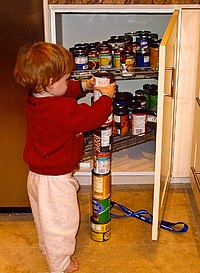
Photo from wikipedia
Individuals with autism spectrum disorders (ASD) have shown impaired performance in canonical and nonsocial working memory (WM). However, no study has investigated social WM and its early development. Using biological… Click to show full abstract
Individuals with autism spectrum disorders (ASD) have shown impaired performance in canonical and nonsocial working memory (WM). However, no study has investigated social WM and its early development. Using biological motion stimuli, our study assessed the development of social and nonsocial WM capacity among children with or without ASD across the age span between 4 and 6 (N = 150). While typically developing (TD) children show a rapid development from age 5 to 6, children with ASD showed a delayed development for both social and nonsocial WM capacity, reaching a significant group difference at age 6. Furthermore, we found a negative correlation between social (but not nonsocial) WM capacity and the severity of autistic symptoms among children with ASD. In contrast, there is a positive correlation between both types of WM capacity and intelligence among TD children but not among children with ASD. Our findings thus indicate that individuals with ASD miss the rapid development of WM capacity in early childhood and, particularly, their delayed social WM development might contribute to core symptoms that critically depend on social information processing.
Journal Title: Autism Research
Year Published: 2022
Link to full text (if available)
Share on Social Media: Sign Up to like & get
recommendations!